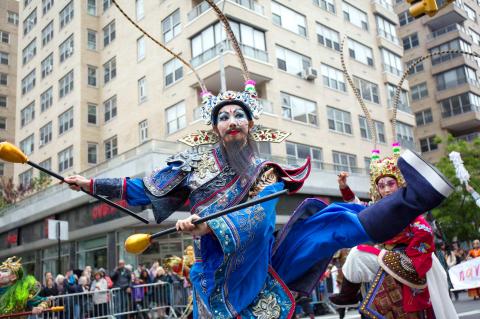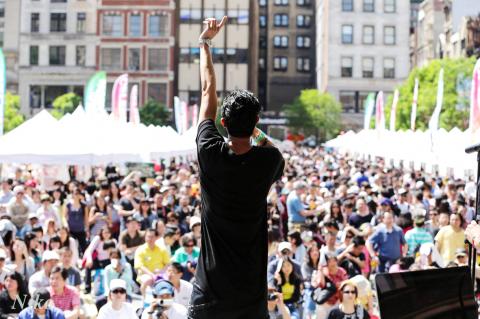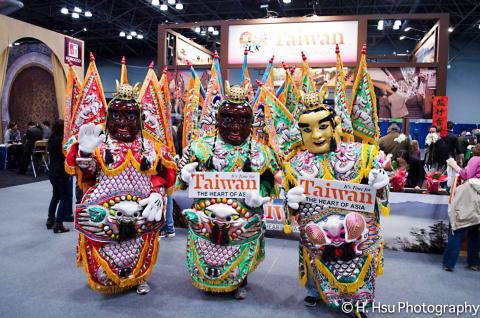A five-hour festival of Taiwanese food, culture and entertainment in New York City’s bustling Union Square on Sunday added to annual Memorial Day Weekend celebrations across the US for Asian Pacific American Heritage Month.
Now in its 16th year, Passport to Taiwan (台灣巡禮) introduced the curious to dozens of Taiwanese foods and beverages, including the iconic oyster omelet (蚵仔煎) and lemon Ai-yu drink (愛玉), and showcased a range of Taiwanese performers.
“We know that Taiwan is less well known internationally and we want to bring out the name of Taiwan to more people,” said Hsu Bo-cheng (許伯丞), one of the organizers.

Photo courtesy of Passport to Taiwan
Hsu said the festival, staffed by 200 to 300 volunteers, not only serves as a primer on Taiwan to those who have never visited, but also helps overseas Taiwanese get reacquainted with their own culture. It was sponsored in part by the Taiwan Tourism Bureau (中華民國交通部觀光局).
Other cities, including Los Angeles, San Francisco and Houston, hold similar events in May, Hsu said, which was designated Asian Pacific American Heritage Month in 1990.
Taiwanese grandmas were among those who helped prepare food sold at Passport to Taiwan. Besides the oyster omelette, the eats also included braised pork rice (滷肉飯), popcorn chicken (鹹酥雞) and turnip cake (蘿蔔糕), among others.

Photo courtesy of Passport to Taiwan
About a half-dozen Taiwanese entertainment groups also took the stage, including some playing traditional Taiwanese instruments, Hsu said.
Among them were artists participating in this year’s Hello Taiwan Tour (Hello Taiwan! 2017巡迴演唱會), a week-long event that introduces Taiwanese performers to American audiences. The tour is sponsored by the Taiwan Ministry of Culture (中華民國文化部) and Taipei Cultural Center in New York (駐紐約臺北文化中心).
This year’s roster included Hakka vocalist and band leader Gina Can (吉那罐子), as well as Golden Melody Award winners Biung (王宏恩), an aboriginal singer, and Sean Huang (黃昺翔).

Photo courtesy of Passport to Taiwan
The Spintop Snipers (三峽定點陀螺隊) also displayed their prowess — and uncanny accuracy — in launching spinning, gyro-top toys onto tiny platforms positioned at varying heights.
Big Turn Out
Hsu said the festival usually attracts between 20,000 and 30,000. This weekend’s weather was cooler than in previous years, when a combination of heat and humidity has made it feel more like Taiwan.
Hsu stressed the importance of getting more younger people involved in Passport to Taiwan, which he said provides Taiwan needed exposure to the uninitiated.
“People from Taiwan are always trying to find ways to contribute to the international community,” Hsu added.
Taiwan has found itself making headlines around the world these last six months, first with President Tsai Ing-wen’s (蔡英文) congratulatory call to Donald Trump on winning the US presidential election, and then being blocked from this year’s World Health Assembly meeting in Geneva likely because of pressure from China.
Taiwan’s Council of Grand Justices last week also ruled that the island’s Civil Code violated constitutional guarantees of freedom of marriage and equality, paving the way to legalize same-sex unions.
Hsu hopes that events like Passport to Taiwan and the Hello Taiwan Tour can push Taiwan into the consciousness of more people in the US and around the world.
“To promote Taiwan a little at a time, we hope to turn the tide one day and to make Taiwan a responsible and a known contributing member of the international community,” Hsu said.

June 23 to June 29 After capturing the walled city of Hsinchu on June 22, 1895, the Japanese hoped to quickly push south and seize control of Taiwan’s entire west coast — but their advance was stalled for more than a month. Not only did local Hakka fighters continue to cause them headaches, resistance forces even attempted to retake the city three times. “We had planned to occupy Anping (Tainan) and Takao (Kaohsiung) as soon as possible, but ever since we took Hsinchu, nearby bandits proclaiming to be ‘righteous people’ (義民) have been destroying train tracks and electrical cables, and gathering in villages

Dr. Y. Tony Yang, Associate Dean of Health Policy and Population Science at George Washington University, argued last week in a piece for the Taipei Times about former president Ma Ying-jeou (馬英九) leading a student delegation to the People’s Republic of China (PRC) that, “The real question is not whether Ma’s visit helps or hurts Taiwan — it is why Taiwan lacks a sophisticated, multi-track approach to one of the most complex geopolitical relationships in the world” (“Ma’s Visit, DPP’s Blind Spot,” June 18, page 8). Yang contends that the Democratic Progressive Party (DPP) has a blind spot: “By treating any

This year will go down in the history books. Taiwan faces enormous turmoil and uncertainty in the coming months. Which political parties are in a good position to handle big changes? All of the main parties are beset with challenges. Taking stock, this column examined the Taiwan People’s Party (TPP) (“Huang Kuo-chang’s choking the life out of the TPP,” May 28, page 12), the Democratic Progressive Party (DPP) (“Challenges amid choppy waters for the DPP,” June 14, page 12) and the Chinese Nationalist Party (KMT) (“KMT struggles to seize opportunities as ‘interesting times’ loom,” June 20, page 11). Times like these can

Swooping low over the banks of a Nile River tributary, an aid flight run by retired American military officers released a stream of food-stuffed sacks over a town emptied by fighting in South Sudan, a country wracked by conflict. Last week’s air drop was the latest in a controversial development — private contracting firms led by former US intelligence officers and military veterans delivering aid to some of the world’s deadliest conflict zones, in operations organized with governments that are combatants in the conflicts. The moves are roiling the global aid community, which warns of a more militarized, politicized and profit-seeking trend